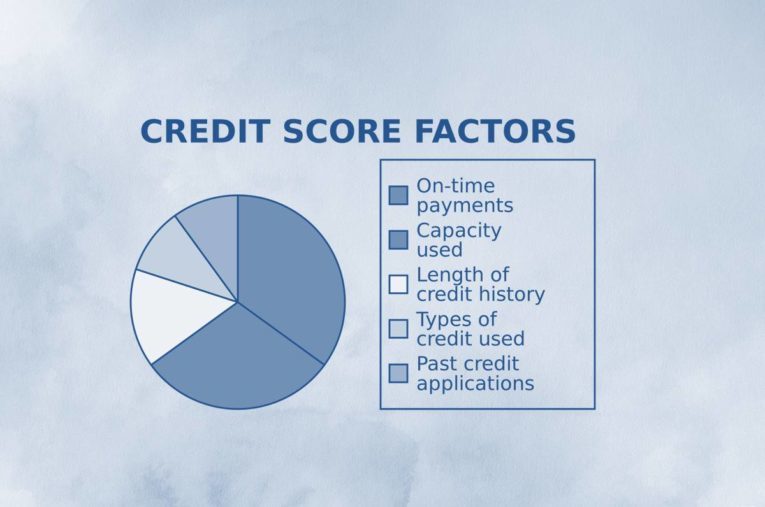There Are 5 Factors For Mortgage Loan Eligibility – however, there are some in-between guidelines that are just as important…for conventional loan programs only.
Buying a home is a big decision, and one of the most important factors to consider is whether you qualify for a mortgage loan. Lenders use a variety of factors to determine your eligibility, including your credit score, income, debt-to-income ratio, employment history, and down payment. Understanding these factors can help you determine if you’re ready to take the next step toward homeownership.
Table of Contents
Credit Score and History

Your credit score and history are one of the most important factors that lenders consider when determining your mortgage loan eligibility. Your credit score is a numerical representation of your creditworthiness.
It is based on factors like your payment history, credit utilization, length of credit history, and types of credit. Lenders typically require a minimum credit score of 620, for some of the products available for First Time Homebuyers. However, the higher your credit score is; the better your financing features will be.

A higher score can help you qualify for better interest rates and loan terms. Additionally, lenders will review your credit history to look for any red flags. This includes but is not limited to, missed payments of 30 days or more, collections, unpaid tax liens, and other criteria. The credit is reviewed for anything that could indicate a higher risk of default.
Income and Employment History

Another key factor that lenders consider when determining your mortgage loan eligibility is your income and employment history. Lenders want to ensure that you have a stable source of income and that you can afford to make your mortgage payments.
They will review your employment history to see how long you have been with your current employer and whether you have a steady income.
The lender is always concerned and will also look at your debt-to-income ratio. This is the amount of debt you have compared to your monthly income.
Debt-to-Income Ratio

Your debt-to-income ratio is one of the key factors that lenders consider when determining your mortgage loan eligibility. This ratio is calculated as stated; by dividing your monthly debt payments by your monthly gross income.
Debts or Obligations Include the following:
Alimony, child support, separate maintenance, installment loans, revolving charges (credit cards), secured loan, business debts in the borrower’s name, deferred installment debt, Federal income tax installments (if applicable), garnishment, lease payments, rental housing payment, student loans, and more.
The Facts For Underwriting:
Most Lenders will use their Automated Underwriting System: Desktop Underwriter for Fannie Mae (FNMA) and Loan Prospector for Freddie Mac (FHLMC).
When the underwriting is completed by their automated service, they enter the information and verified documentation into the system. The underwriting system will spit out the approval or denial based on the information that you have submitted.
Automated Underwriting:
When the applicant(s) have the following criteria-
- the average credit score, (680 or higher), the higher the credit score (s), the higher the DTI ratio may be approved.
- debt to income (DTI) no more than 36 to 45%, depending upon the LTV of the loan, the lower the LTV the better for the higher the DTI to be approved. More downpayment.
- stable employment of at least 2 years
- sufficient assets to close the loan, and 2 months +- reserves (the more reserves you have after closing the higher the DTI may be in the automated underwriting system.
- the loan to value (LTV) plays a very important role in these figures as well.
Of course, the subject property appraisal must be approved as well and underwritten by the underwriter.
Example of Manually Underwritten Loans
Conventional Primary Residence – credit score of 680, loan to value (LTV) of 95%, the debt to income can be no more than 36%. *This is based upon the guidelines of the agencies that most lenders use; FNMA and FHLMC. * the lender guidelines may vary in some instances but not if submitted to the agencies.
Down Payment and Savings
Another important factor that lenders consider when determining your mortgage loan eligibility is your down payment and savings. Lenders typically require a down payment of at least 3% to 20% of the home’s purchase price.
The more assets you can have verified, the better your chances of getting approved for a mortgage loan. Every 5% deducted from the loan to value increases your approval. If your LTV is 80% or less, you will not be required to have mortgage insurance (MI).
Additionally, lenders will also verify your savings to ensure that they are seasoned, to make sure there are no outstanding loans. All funds should be seasoned funds. Normally at least 90 days old. Unless of course, you can still prove these funds are not borrowed.
It is important to make sure that you do not move your assets from one account to another unless you have the documentation of the transfers.
It’s important to have a solid savings plan in place before applying for a mortgage loan.
Property Appraisal and Loan-to-Value Ratio
The property appraisal and loan-to-value (LTV) ratio are also important factors that lenders consider when determining your mortgage loan eligibility, (included above).
The property appraisal is an assessment of the value of the property you want to buy, and it helps the lender determine how much they are willing to lend you. The LTV ratio is the amount of the loan compared to the appraised value of the property.
Lenders typically prefer a lower LTV ratio, as it indicates that you have more equity in the property and are less likely to default.
EndNote:
These 5 Factors That Determine Mortgage Loan Eligibility is information highlights but may not be all conclusive. This is due to the fact that each mortgage loan is unique to the lender, the applicant (s), the property, and the total evaluation process.
As always, we try to stay within the latest updated criteria that are available for our references. This information may not be all-inclusive but it is up-to-date as possible. Mortgage guidelines change frequently and it is not always available for analysis.



